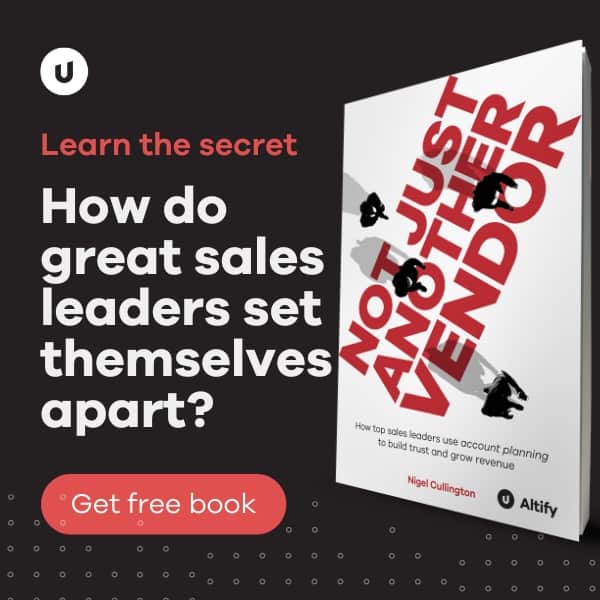After a webinar I did in December with The TAS Group, I got an angry email from someone who attended. He wrote, “Instead of all the negatives how about offering some sales help for those of us that still have a job??”
I understood his perspective right away. The messages I delivered during the webinar were for sales leaders. I stated some statistics about the state of selling and some recommended courses of action. But if you’re a salesperson struggling to make your numbers, you don’t want to hear about the pain your managers are dealing with from some industry analyst.
I got back to this guy right away. I wrote, “Send me your address. I’ll send you the best possible help I can.” Last week I sent him one of my few remaining copies of the original first edition of How Winners Sell. (It’s out of print.) He was very, very appreciative and wrote, “… thanks so much Dave! A partner in sales forever…” I love it!
So for this committed sales professional and the rest of you wind up reading this post, here are some of the best things that salespeople can do—by and for themselves if necessary—to assure long-term sales success. This list is not the results of a research study. It’s what we observe the most successful salespeople doing every day:
-
If you are not being handed qualified sales leads by someone else, you must become an expert in creating your own demand and generating your own leads. There are world-class experts out there who write blogs and articles that will help you get educated. Mac MacIntosh and Brian Carroll are two whom I hold in high regard. Look at my podcasts page above for an interview I did with Brian.
-
Unless you sell across many industries, get very, very familiar with the industry into which you sell. You’ve heard this before right? It can literally make the difference between making your numbers and not, year after year.
-
Get to the point where you can make a formal business case for your product or service. This applies to most, but not all, B2B sales situations. The more expensive your offering, the more important it is. Take 27 minutes and listen to this podcast if you aren’t convinced.
-
Get as comfortable as you can with technology, appropriate to what’s required to be successful at your sales job. It can help you learn, perform research on your customers and competitors, communicate, find business opportunities, grow your business network, sell more effectively and generally make you more efficient. Just remember though, technology is a medium. The end is winning business.
-
Make planning how to win your sales opportunities a habit. This week I again ran across this blog post by my friend Geoffrey James, based on an interview he did with “Waldo” Waldman. When I say planning, I don’t mean writing a 90-page document. I’ve seen sales opportunity plans two pages long that absolutely made the difference in winning large deals. One more point: I’m not interested in stifling your creativity or giving you busy work to do. If you’re selling by the seat of your pants, starting this planning practice with something as simple as a checklist can make a big difference.
-
Qualify, qualify, qualify. Great salespeople don’t pursue business that isn’t winnable or worth winning. They make that determination early on by asking tough questions.
-
Learn how influence and power work within organizations. Two timeless books to help you learn: Rick Page’s Hope is Not a Strategy and Jim Holden’s Power Base Selling. The TAS Group has powerful content in this area. If you’re a TAS Group client and you’re not using it, you should.
-
Learn how to compete more strategically. For 80% of salespeople, competitive selling means telling their customers about their competitors’ weaknesses. There is so much more to it than that. ESR gives The TAS Group high marks for their content in this area as well. You can also follow Ken Allred’s blog to get you further into a competitive state-of-mind.
-
Referral sell. Make zealots out of your best customers. Train them how to help you sell. Tell them precisely what they have to do to be an unassailable reference for you. I like what Paul McCord wrote on the subject.
-
Stay away from quick tips and tricks. They will not help you be more successful. They will only give you the sense that you don’t have to invest the time, money, and effort in what it really takes to win—the 9 things I listed above, plus a whole lot more.



